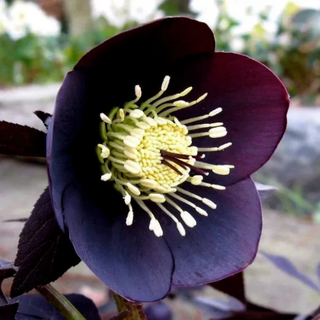DINOSAUR FOOD, Maidenhair Tree, Ginkgo biloba
- Unit price
- / per
Description
Ginkgo biloba, commonly known as ginkgo or gingko, also known as the ginkgo tree or the maidenhair tree, is the only living species in the division Ginkgophyta, all others being extinct. It is found in fossils dating back 270 million years. Native to China, the tree is widely cultivated and was introduced early to human history.
Some living trees are believed to be over 1,500 years old. The first record of Europeans encountering it is in 1690 in Japanese temple gardens, the ginkgo is also widely planted in Korea and parts of Japan; in both areas, some naturalization has occurred, with ginkgos seeding into natural forests.
Ginkgos adapt well to the urban environment, tolerating pollution and confined soil spaces. They rarely suffer disease problems, even in urban conditions, and are attacked by few insects. For this reason, and for their general beauty, ginkgos are excellent urban and trees, and are widely planted along many streets.
Ginkgos are also popular subjects for growing as penjing and bonsai; they can be kept artificially small and tended over centuries. Furthermore, the trees are easy to propagate from seed.
Type: Hardy tree
Hardiness zones: 3-9
Note: This plant species may cause dermatitis in some individuals. The use of gloves when handling may be beneficial.
Seeds per pack: 3 seeds
Germination: Sow the ginkgo seeds in late winter approximately six weeks before the last frost. Plant them in a pot that has holes in the bottom so water can drain. Obtain a mineral-rich potting mix of 50% sand and 50% loam. Place the seed just under the surface of the soil. Then place the potted ginkgo seeds outdoors against a south-facing wall with full to partial sun exposure. The fluctuating temperatures will initiate the seeds growth. Cover each pot with a piece of wire mesh to protect the seeds from rodents. Be sure to maintain constant moisture in the sand mixture while the ginkgo seeds germinate. Watch for the first signs of sprouting in three weeks, although seeds can take up to three months to germinate.
DINOSAUR FOOD, Maidenhair Tree, Ginkgo biloba
- Unit price
- / per
Multiple secure payment options available.
Adding product to your cart
You may also like
Description
Ginkgo biloba, commonly known as ginkgo or gingko, also known as the ginkgo tree or the maidenhair tree, is the only living species in the division Ginkgophyta, all others being extinct. It is found in fossils dating back 270 million years. Native to China, the tree is widely cultivated and was introduced early to human history.
Some living trees are believed to be over 1,500 years old. The first record of Europeans encountering it is in 1690 in Japanese temple gardens, the ginkgo is also widely planted in Korea and parts of Japan; in both areas, some naturalization has occurred, with ginkgos seeding into natural forests.
Ginkgos adapt well to the urban environment, tolerating pollution and confined soil spaces. They rarely suffer disease problems, even in urban conditions, and are attacked by few insects. For this reason, and for their general beauty, ginkgos are excellent urban and trees, and are widely planted along many streets.
Ginkgos are also popular subjects for growing as penjing and bonsai; they can be kept artificially small and tended over centuries. Furthermore, the trees are easy to propagate from seed.
Type: Hardy tree
Hardiness zones: 3-9
Note: This plant species may cause dermatitis in some individuals. The use of gloves when handling may be beneficial.
Seeds per pack: 3 seeds
Germination: Sow the ginkgo seeds in late winter approximately six weeks before the last frost. Plant them in a pot that has holes in the bottom so water can drain. Obtain a mineral-rich potting mix of 50% sand and 50% loam. Place the seed just under the surface of the soil. Then place the potted ginkgo seeds outdoors against a south-facing wall with full to partial sun exposure. The fluctuating temperatures will initiate the seeds growth. Cover each pot with a piece of wire mesh to protect the seeds from rodents. Be sure to maintain constant moisture in the sand mixture while the ginkgo seeds germinate. Watch for the first signs of sprouting in three weeks, although seeds can take up to three months to germinate.
You may also like
You may also like
Recommended Products
CUSTOMERS ARE ALSO BUYING THESE
Testimonials
Here's What Some Of Our Customers Had To Say (Thank you!)

Ferri Seeds is truly a wonderful company. They take the utmost care when delivering your seeds. Mine arrived promptly and when I had any questions, they were so happy to help me. I am looking forward to getting more from them soon. Thank you David for making this a delightful experience.

I got these pretty quickly and in perfect order. I can't wait to see what they look like once I plant them. I have another colour and they were so pretty I had to try these. I have used this seller a few times now with great success, and will again. Everything I have ordered has been of good quality!

I was impressed with Ferriseed’s selection of seeds. Ordering was a breeze and the seeds arrived in a perfect little padded envelope in 9 days. I am very happy and will order from here again. Many thanks.

Never grew coleus from seed, and it was surprisingly easy. They germinated quickly on my heat mat and grow lights. Can't wait to see them in the garden!

We placed our order on Thursday and received it on Monday. Here in Canada the tracking link is accurate. Ferri seeds tells you when they're shipping and when your order is delivered, the seeds arriving in excellent condition. We will definitely be ordering again this spring. Keep up the good work!

Great product ! All seeds germinated and flourished nicely.

My order, made late afternoon, April 27th, and needed in a bit of a rush, was mailed next morning and arrived in my rural mailbox in BC, May 5th.
Thank you for your cheerful, friendly emails and prompt service. I certainly recommend you others and will be sure to keep an eye on the range of seeds you offer in future.

Gt the delivery on time. One week since i potted the seeds. Some of the seeds are already sprouting so i am very happy so far. No complaints yet

Thank you Ferri Seeds for the timely shipments of seeds I ordered. I have been looking to replace that plant for years.

Excellent service, (fastest!!) Great packaging. Also very appreciated is all of the information on how to 'deal' with perennial seeds! Will order again!! Thank you

Ferri Seeds – one of the best online and most helpful businesses I have ever had dealings with. Quick turnaround, dispatch, and beautifully packaged seeds. What more could you want – beautiful flowers would be nice. Well I am sure they will turn out to be.

The seeds came just as described. I appreciate the good follow-up to my questions also.

Fantastically seedlings. They were well packaged. I planted them right away and they’re growing nicely so far.

Fast service, amazing communication!

I happened across Ferri Seeds website when I Googled a particular plant I’d been looking for. I was impressed by their selection of all types of seeds and their good product descriptions along with detailed germination instructions. I found the site and ordered on a Saturday. On Sunday I got a notice that my order had been shipped! The seeds were in my P.O. box on Friday. Such amazing service. It’s too early to comment on germination rates — I’ve just started the stratification process today.

Received in 1-2 weeks in Canada, Ontario. Everything is as ordered. No issues. Ordered through the official web site.

The Japanese anemone seeds arrived promptly. Thank you Ferri Seeds!!

Very fast I am excited

Customer service excellent. Was able to order streptocarpus seeds. Hard to find.

Thank you for having showy Asters., Birdsnest Delphiniums and Colbalt Delphiniums and Obedient plant seeds in Stock. My butterfly garden is almost now complete. And I am cold stratificationing the seeds.

I had a herbarium project with a short deadline. Ferri Seeds were professional, friendly and sent me Alstroemeria seeds promptly. The seeds arrived in a protective sleeve within a letter envelope. The herbarium is complete! I highly recommend Ferri Seeds! Thank you!

Very good seller!

Very satisfied, quick service

It's been a pleasure dealing with Ferri Seeds!

Amazing selection. Fast service. I look forward to ordering in the future.
We carry a diverse selection seeds from around the world, many are rare and hard to find!
Regular new seed stock, special cold/dry storage facility, and record keeping ensures our stock is fresh and ready to grow for you.
When you sign up, you are agreeing to receive promotional emails and other marketing communications from us. In the future, you can always unsubscribe.


